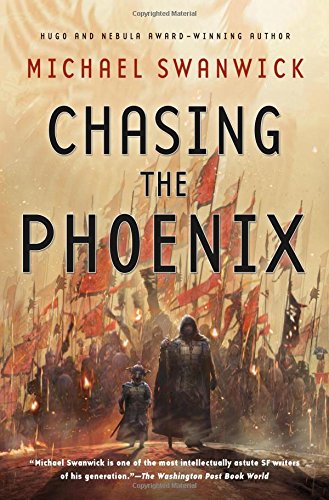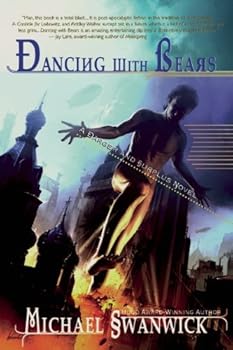
![]() Chasing the Phoenix by Michael Swanwick
Chasing the Phoenix by Michael Swanwick
Michael Swanwick’s Chasing the Phoenix is a slight but solidly enjoyably pleasant story of two clever con-artists that may remind readers of Fritz Lieber’s Fafhrd and Gray Mouser a bit, though the reflection/homage is perhaps a bit pale. The pleasures of the book arise from the humorously complex situations the two fall into (and have to escape out of), the sharp character banter, and the generally witty writing all around. How far those attributes carry you past an intriguing but thin worldbuilding, the not-too-substantive plot, and somewhat dull characters will go a long way to determining your level of enjoyment.
The setting is a “Post-Utopia” far future that has only recently begun to clamber out of the cataclysmic battle between humanity and powerful AIs that took place generations ago. Wandering across this wonderfully rich mélange of futuristic (tailored viruses, frightening war machines, genetic engineered creatures) and more primitive technology are the grifters Darger and Surplus (himself a genetically engineered dog-human), looking for gullible marks wherever they can find them. The more specific “where,” in this case is China, which after the catastrophic war has devolved back into warring feudal nations. The two finagle their way into the advisory circle of a backwater ruler named The Hidden King and convince him they can lead him to his destiny of uniting all of China once more. Somewhat to their surprise, their plan actually begins to succeed, thanks to some luck, some old con man bravado, and with the help (and hindrance) of a cast of fantastically named characters: Capable Servant of No Special Distinction, who attaches himself as their personal aide; Powerful Locomotive, the Hidden King’s top general; Vicious Brute, a Hillman bandit, and others. Two especially prominent female players are Fire Orchid, who somehow becomes Surplus’ fiancée, and White Squall, the Hidden King’s archaeologist and supplier of ancient weapons (which she’s dug up from Utopian sites).
 Darger and Surplus are recurring characters in a series of short stories. I have not read any of them, but you can find them in Dancing with Bears. However, while references are made to past adventures, reading them first isn’t at all necessary. It’s simply clear that we as readers have fallen into the middle of a tale (the story being their clearly long-running partnership) rather than the very beginning. The two have the warm fondness and shorthand communication/understanding one would expect for two who have been partners for so long. That said, the two were strangely disassociated throughout, either with wholly separate adventures or plotting together without us seeing them interact all that much. In other words, while you got that they know each other’s mind quite well, the duo lacked that true sense of camaraderie I’ve found in other pairings, such as the aforementioned Fafhrd and Gray Mouser or say, any of several in Steven Erikson’s Malazan world — Tehol and Bugg or Hedge and Fiddler.
Darger and Surplus are recurring characters in a series of short stories. I have not read any of them, but you can find them in Dancing with Bears. However, while references are made to past adventures, reading them first isn’t at all necessary. It’s simply clear that we as readers have fallen into the middle of a tale (the story being their clearly long-running partnership) rather than the very beginning. The two have the warm fondness and shorthand communication/understanding one would expect for two who have been partners for so long. That said, the two were strangely disassociated throughout, either with wholly separate adventures or plotting together without us seeing them interact all that much. In other words, while you got that they know each other’s mind quite well, the duo lacked that true sense of camaraderie I’ve found in other pairings, such as the aforementioned Fafhrd and Gray Mouser or say, any of several in Steven Erikson’s Malazan world — Tehol and Bugg or Hedge and Fiddler.
The two also have relatively removed personalities. Granted, Darger is playing the role of stoic mathematician/philosopher (his title is “Perfect Strategist”), but even so he comes across as more than a little vanilla. Surplus is a more vibrant personality, and his interactions with his “fiancée” Fire Orchid might have been my favorite parts of the novel (certainly the funniest), but unfortunately he disappears for surprisingly long stretches.
As the challenges and obstacles pile one atop the other, growing ever more convoluted, the situations themselves become more humorous, and one does wonder how they’ll extricate themselves, but there’s rarely any true sense of danger or urgency. They mostly skate through pretty easily and even if a reader might worry they won’t this “last time,” it’s always made clear they’re ready to cut and run at the first real sign of personal risk. The still-dangerous AIs lurking in the background have a bit of a bite to them (and their dialogue is particularly well-done), and I wish a little more had been done in that area.
In the end, I’d call Chasing the Phoenix a nice little tide-you-over snack between works of more substance or depth. It’s witty, will often make you laugh out loud, presents a sense (not a full picture) of a richly intriguing world, offers up a number of quirkily engaging if not fully-rounded characters, has a wryly inviting voice, and wraps up at just about the right length (maybe just a tad long). I wouldn’t have wanted to read much more of this story with the two, but I’d pick up a second short novel with them at the center.



This one might be worth reading just for those great character names, particularly Capable Servant of No Special Distinction. Without spoiling anything, is that meant to be taken at face value or is it an authorial wink at hidden depths?
it was his mother’s way of ensuring a job–good enough that people would hire him, not so good that they’d fear he’d leave them for better work. As for hidden depths or not, yes, that would be telling :)
This has potential from the get-go, and there was some great storytelling, but ultimately the book came short for me.